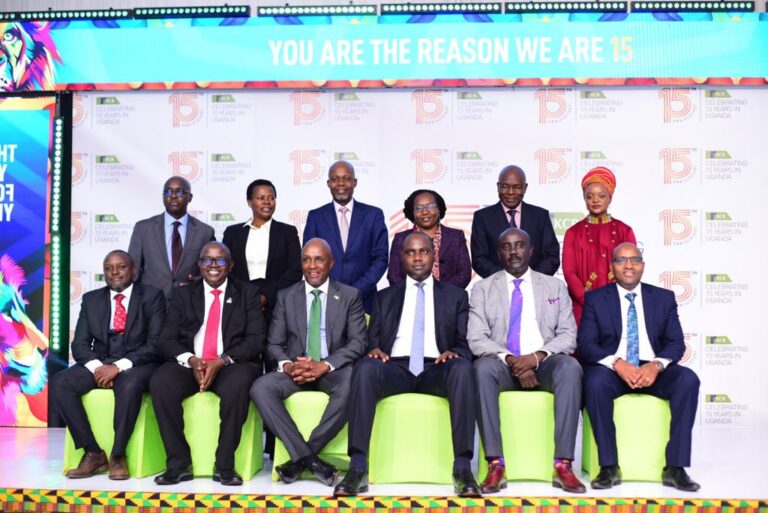KCB Bank has marked its 15th anniversary since its establishment in Uganda. During the celebration, the bank revealed that it will close the year with Ushs. 1 Trillion balance sheet.
Incepted in 2007, KCB Bank Uganda has for the last 15 years offered financial services via traditional and online banking channels with the aim of enabling access to timely financial services to the banks customers in Uganda and in the diaspora.
While making remarks at the 15th Anniversary Celebration at Kampala Serena Hotel, KCB Bank Uganda Managing Director, Edgar Byamah, said, “At present, our bank boasts of an asset base of over Shs. 961,430,000 and over 40,000 customers, which success is greatly attributed to a committed team that has keenly served the bank over the years. The growth registered has influenced our expansion to 14 branches, and has necessitated us to innovate digital-driven banking solutions so that we extend banking services through channels like Online banking, Kaycee – Chatbot, the ATM Recycler Machine among others.”
He further revealed, “The advancements would not have been possible without sound leadership, which stems right from group level and spirals down to the different markets where the bank has a footprint like Uganda. Over the years, KCB Bank Uganda has grown organically and as a result, registered significant growth in its balance sheet. Today, we can confidently project to close our fifteenth year with a balance sheet of one trillion Uganda shillings.”
Hon. Henry Musasizi, The State Minister of Finance, Planning and Economic Development (MoFPED), General duties, noted, “15 years of great service is what we are witnessing today and I want to take this opportunity to commend KCB Bank Uganda for its positive contribution towards the banking sector and the immense opportunity they have opened to the public through the service they offer. I believe if we continue on this path, we will constantly realize the growth of our economy since financing through partners like KCB. MoFPED remains committed to providing a suitable environment for companies to grow sustainably among other economic initiatives.”
KCB Bank Uganda, Board Chairman, Constant Othieno Mayende, noted “The environment we are operating in is very competitive, and the numbers of banking institutions allude to this. Currently, the market has over 25 commercial banks. As a bank, we have a strategy and we are sharply focusing on this strategy to enable us to deliver on our mandate and vision of being the preferred financial solutions provider in Uganda.”
Othieno added, “Our commitment is to serve our customers, with foresight that focuses on key three parameters; customers, efficiency and digitization. We understand that our customers today need financial services that are always-on and can be accessed within arm’s reach. We therefore we have to reach our customers by digitizing our services. Consequently, management is always challenged by the board to ensure that the customer is kept at the forefront of whatever we do.”
Commenting on the bank’s 15th anniversary, KCB Group CEO, Paul Russo mentioned, “As a Group, we pride ourselves in being a financial enabler that gives our customers access to financial services that transcend borders. Given the potential of Uganda as a strategic business partner within the East African Community Economic Bloc, the future for KCB Bank Uganda is very bright. Indeed, what the Bank can do in contributing to the growth of this region should be limited only by our imagination. On this special occasion, we are re-dedicating ourselves to working closely with all stakeholders to unlock the potential in this country.”
“As a customer-centric brand, we are constantly registering new developments so that we can serve our customers better through our brand promise of Go Ahead with them, thus, we continue to design products and services that address their banking and financial service needs. In the near future, we shall be unveiling our new and improved Mobile Banking Platform purposed to enable our customers to conduct real-time transactions like utility payments, buying airtime, checking account balances, Bank to bank transfers, bank-to-wallet transfers among many other activities without necessarily visiting the bank.” Byamah concluded.

